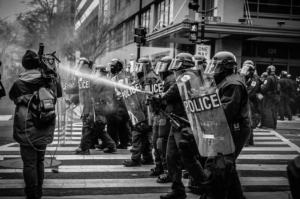Excessive Force: Protestors Across the Country Filing Excessive Force Cases Against Police Departments

Protesting and Police
Following the tragic death of George Floyd (which we discussed in a blog that can be found HERE), protestors across the U.S. set out to condemn police brutality and voice their support in favor of substantial police reform. However, several protests experienced tense – and oftentimes violent – encounters between protestors and police, which in turn resulted in dozens of excessive force lawsuits filed against various police departments. In today’s blog, we will discuss the flood of excessive force cases that have stemmed from these recent protests against police brutality. Additionally, we offer a brief set of tips on filing excessive force lawsuits and what obstacles to expect from a municipality defending this type of constitutional claim.
Police Departments Facing Slew of Excessive Force Suits
According to research conducted by CBS MoneyWatch, more than 40 excessive force cases have been filed in connection with the protests over George Floyd’s death. These lawsuits vary widely in terms of location, with several cases being filed in New York City, Seattle, WA, Columbus, OH, Philadelphia, PA, and more. Moreover, these cases also vary with respect to the relief sought by the plaintiffs. While many of these excessive force lawsuits seek monetary damages, others – such as the 8 lawsuits filed by protestors against the City of Portland – seek policy changes in the form of bans of tear gas, rubber bullets, and use of explosive devices against protestors.
In Chicago, the City’s Bureau of Internal Affairs (“BIA”) and Civilian Office of Police Accountability (“COPA”) together received 466 complaints related to police officers’ actions during the protests against racial injustice this summer. Of the COPA’s complaints currently under investigation, 61% allege excessive force. The next most common type of complaint was “4th Amendment/Improper Search” issues, which accounted for 17% of the COPA’s recent complaints. The COPA’s webpage dedicated to protest-related complaints and information can be found HERE.
The City of Chicago is also facing at least one excessive force lawsuit resulting from the protests against police brutality. Namely, local journalist Jonathan Ballew sued the City of Chicago and an unnamed police officer after he was allegedly pepper-sprayed during the protests. According to Ballew’s complaint, despite wearing a credentialed press pass around his neck and maintaining a safe distance from police, an officer assaulted Ballew with pepper spray. Ballew recorded the entire encounter and uploaded it to his Twitter page.
In the neighboring state of Indiana, the Indianapolis Metropolitan Police Department (“IMPD”) is also facing at least two excessive force lawsuits in the wake of recent protests. The first lawsuit was brought by two women – Ivoré Westfield and Rachel Harding – who were beaten with batons and shot with pepper balls by IMPD officers. Specifically, Westfield and Harding were on their way home from the protests when they were confronted by IMPD for being out past curfew and subsequently beaten on video (WARNING: graphic video). The second lawsuit was filed by the ACLU on behalf of the Indy10 Black Lives Matter group and three individual protestors who were allegedly subjected to tear gas, pepper balls, and other aggressive policing tactics. The ACLU’s complaint seeks monetary damages in addition to an injunction barring IMPD officers from using “objectively unreasonable force through the use of tear gas, pepper-ball projectiles, stun grenades, and rubber bullets.”
What Should Plaintiffs in Excessive Force Cases Know Before Filing?
Filing an excessive force case pursuant to the 4th Amendment/42 U.S.C. § 1983 can be an effective way to recover damages for wrongful conduct by police or to induce meaningful change within a local police department. However, given that these types of cases are typically filed against government entities and agents, there are also significant roadblocks to overcome before a plaintiff can receive their requested relief. Here are just a few tips on what to know about excessive force claims before filing:
- Be Aware of Qualified Immunity. As we discussed in a prior post (insert link to qualified immunity blog), the doctrine of qualified immunity can protect police officers from liability in a civil case. In fact, according to a Reuters report on qualified immunity, 57% of courts found in favor of police officers when faced with legal questions regarding qualified immunity from 2017-2019. These favorable results for police officers are at least partially due to the limited test applied to qualified immunity issues, which allows police to evade culpability as long as their conduct did not specifically violate “clearly established” precedent.
- Potentially Heightened Burden of Proof. Plaintiffs filing excessive force cases should acknowledge the fluctuating burdens of proof applied to these claims. In most states, courts require plaintiffs to prove their case by a “preponderance of the evidence,” which is significantly lower than the criminal standard. However, other states force plaintiffs to satisfy a higher standard, e., proof that the officer engaged in unlawful conduct by “clear and convincing evidence.” Be sure to research your jurisdiction and become familiar with your state’s burden of proof for excessive force claims.
- Gather evidence prior to filing. Outside of the legal issues discussed above, plaintiffs should also gather all relevant evidence prior to filing. Important evidence could include any pictures or videos taken before, during, or after the acts of excessive force took place. In terms of any injuries suffered, plaintiffs should take pictures of their injuries and seek immediate medical attention, while also ensuring that all medical treatment is carefully documented.
- Consult an attorney. Contacting an experienced civil rights attorney can help you understand your jurisdiction’s standard with respect to excessive force claims and the scope of your potential claim. Attorneys with knowledge and first-hand experience working on excessive force cases – such as the civil rights experts at Coffman Law – can typically provide a free consultation to discuss your case.
About Coffman Law Offices, P.C.
Coffman Law is committed to providing superb legal representation for people who are suffering from severe personal injuries or are dealing with the loss of a loved one due to negligence or misconduct. Coffman Law is a small, results-driven firm focused on ensuring that clients receive the compassion, attention, and consideration that they need to seek adequate redress for injuries or loss. The firm is led by Owner and Founding Partner Brian Coffman, who has dedicated his career to helping accident victims navigate the legal system and obtain redress for their injuries. If you have been injured or lost a loved one, contact Coffman Law today for a free consultation.




